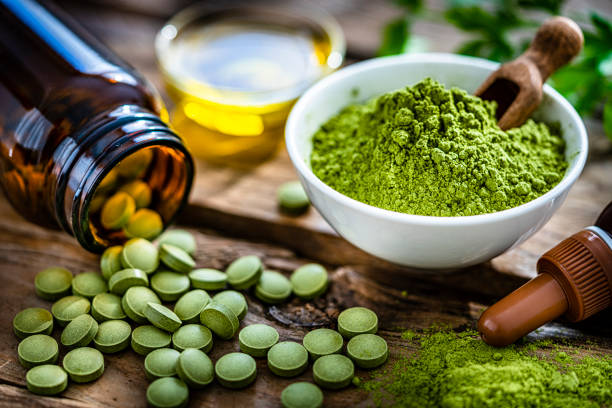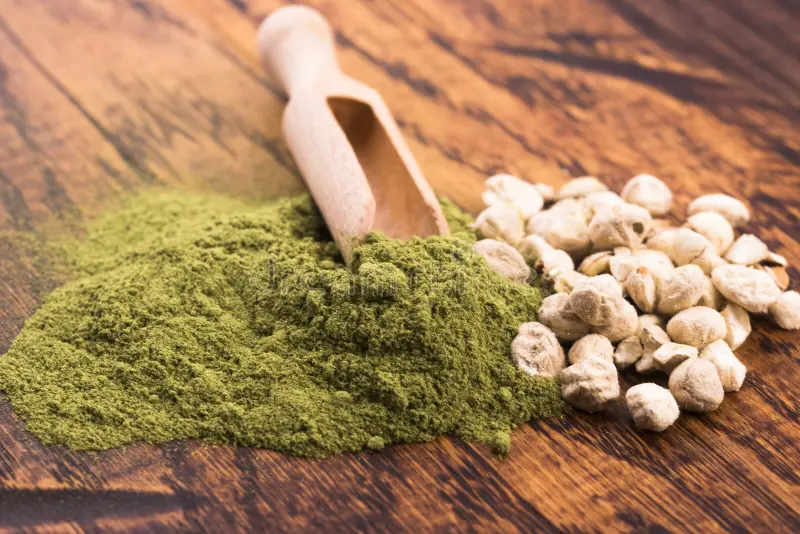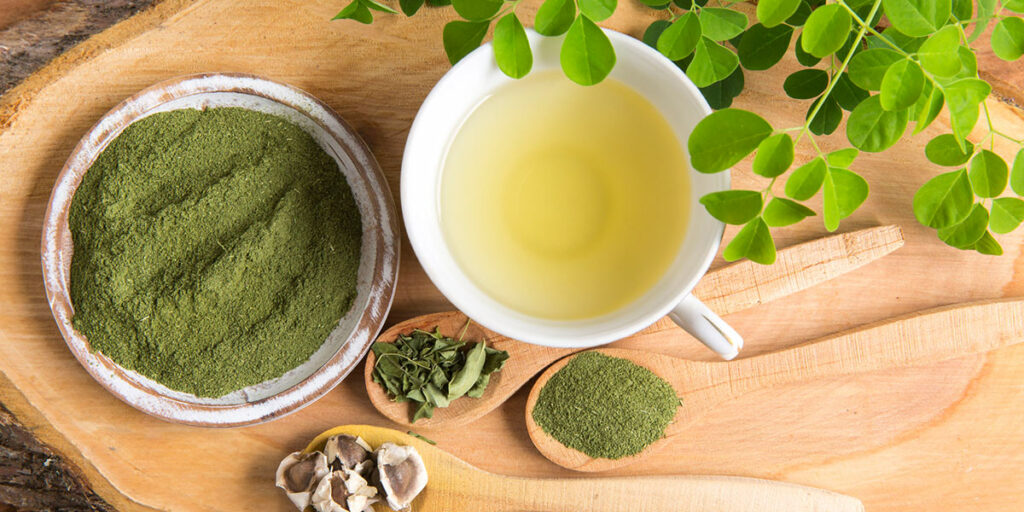Learn how to incorporate this superfood into your daily routine for a healthier lifestyle.
Introduction
Moringa Powder, derived from the leaves of the Moringa oleifera tree, has gained immense popularity due to its exceptional nutritional content and health benefits. In this comprehensive guide, delve into the diverse uses and advantages of this superfood that has been celebrated across cultures for centuries.
Table of Contents
What is Moringa Powder?
Moringa powder is a potent and nutrient-dense substance crafted from the leaves of the Moringa oleifera tree, often referred to as the “miracle tree” due to its numerous health benefits. Originating from Africa and Asia, the leaves are carefully harvested, dried, and finely ground to create this vibrant green powder.
What makes Moringa powder stand out is its exceptional nutritional profile. It’s packed with essential vitamins like Vitamin C, Vitamin A, and Vitamin E, minerals such as calcium and potassium, and powerful antioxidants like quercetin and chlorogenic acid. These components contribute to its renowned reputation as a superfood.
People across cultures have valued Moringa for its versatility and health-boosting properties for centuries. From supporting immune health to potentially aiding in managing blood sugar levels and promoting skin and hair wellness, Moringa powder has gained significant attention in the realm of natural health and wellness.

Benefits of Moringa Powder
- Nutrient Powerhouse: Moringa powder is densely packed with essential nutrients like vitamins (A, C, E, and K), minerals (calcium, potassium, iron), and protein, offering a concentrated source of nutrition.
- Antioxidant Rich: It’s loaded with antioxidants such as quercetin, chlorogenic acid, and beta-carotene, which help combat oxidative stress and protect cells from damage caused by free radicals.
- Supports Immune Function: The abundance of vitamins and minerals in Moringa powder can bolster the immune system, helping the body fend off illnesses and infections.
- Manages Blood Sugar Levels: Some studies suggest that Moringa powder may aid in regulating blood sugar levels, making it potentially beneficial for individuals with diabetes.
- Anti-inflammatory Properties: Its anti-inflammatory compounds can reduce inflammation, potentially easing symptoms of conditions like arthritis.
- Promotes Skin and Hair Health: Moringa powder’s nutrients are beneficial for skin health, offering nourishment and hydration. It can also be used in hair care to strengthen hair and maintain scalp health.
- Supports Digestive Health: With its rich fiber content, Moringa powder may aid in digestion and promote a healthy gut.
- Energy Boost: The nutrient density in Moringa powder can provide a natural energy lift without the crash associated with caffeine.
These benefits make Moringa powder a versatile and valuable addition to a balanced diet, contributing to overall health and well-being.
How to Use Moringa Powder
- Smoothies and Juices: Add a teaspoon or two of Moringa powder to your favorite smoothie or freshly squeezed juice for a nutrient boost. Its mild flavor blends well with fruits like bananas, berries, or pineapple.
- Teas: Mix Moringa powder into hot water to create a nourishing tea. Combine it with lemon or honey for added flavor.
- Salad Dressings: Sprinkle Moringa powder into homemade salad dressings for an extra nutritional punch. It can complement vinaigrettes or creamy dressings.
- Soups and Stews: Stir Moringa powder into soups, stews, or broths just before serving to enhance their nutritional content. It dissolves easily and won’t alter the taste significantly.
- Baking: Incorporate Moringa powder into baked goods like muffins, pancakes, or energy bars for a nutritious twist. Start with small amounts and adjust according to taste.
- Face Masks and Hair Treatments: Mix Moringa powder with water, honey, yogurt, or other natural ingredients to create DIY face masks or hair treatments. Its nourishing properties can revitalize skin and hair.
Remember, moderation is key. Start with smaller amounts, gradually increasing as you get accustomed to its taste and effects. Consulting a healthcare professional for personalized guidance on consumption is always advisable, especially if you have specific health concerns or conditions.

Moringa Powder in Recipes
- Moringa Smoothie: Blend together spinach, banana, almond milk, a spoonful of Moringa powder, and a touch of honey or dates for sweetness. It creates a vibrant, nutrient-rich smoothie perfect for breakfast or a post-workout snack.
- Moringa Energy Balls: Combine dates, nuts (like almonds or cashews), shredded coconut, and a tablespoon of Moringa powder in a food processor. Roll the mixture into balls and refrigerate for a delicious, energy-boosting snack.
- Moringa Pesto: Mix basil, garlic, pine nuts, olive oil, Parmesan cheese, and a teaspoon of Moringa powder in a blender. Toss it with pasta or use it as a flavorful spread for sandwiches or crackers.
- Moringa Hummus: Add Moringa powder to your homemade hummus recipe. It not only boosts the nutritional content but also adds a vibrant green color to the dip.
- Moringa Salad Dressing: Whisk together olive oil, lemon juice, a bit of honey or maple syrup, and a pinch of Moringa powder for a nutritious and flavorful dressing to drizzle over salads.
- Moringa Guacamole: Mash ripe avocados with diced tomatoes, onions, lime juice, cilantro, and a sprinkle of Moringa powder for a nutrient-packed twist on traditional guacamole.
- Moringa-infused Soups: Stir Moringa powder into vegetable soups or broths just before serving to fortify the nutritional content without altering the taste significantly.
Experimenting with Moringa powder in various recipes adds a nutritional boost and introduces a subtle earthy flavor to dishes. Be adventurous and explore different culinary possibilities! Adjust the quantity of Moringa powder to suit your taste preferences.
Potential Side Effects
While Moringa powder is generally considered safe for most people when consumed in moderate amounts, it’s essential to be aware of potential side effects:
- Digestive Issues: In some cases, consuming large quantities of Moringa powder may lead to digestive discomfort such as nausea, diarrhea, or stomach upset due to its high fiber content. Starting with smaller doses can help avoid these issues.
- Interactions with Medications: Moringa may interact with certain medications, affecting their efficacy. If you are on medication, especially for diabetes, hypertension, or blood-thinning medications, consult your healthcare provider before incorporating Moringa into your routine.
- Allergic Reactions: Individuals with allergies to plants in the Moringaceae family (such as ragweed, marigolds, daisies) may experience allergic reactions to Moringa. Symptoms can include itching, rash, difficulty breathing, or swelling.
- Pregnancy and Breastfeeding: There’s limited information about the safety of Moringa consumption during pregnancy or breastfeeding. It’s advisable for pregnant or nursing individuals to consult a healthcare professional before using Moringa powder.
- Quality and Contamination: Ensure you purchase Moringa powder from reputable sources to avoid contamination with heavy metals or harmful substances. Low-quality or improperly processed Moringa products may pose health risks.
It’s crucial to practice moderation and monitor your body’s response when introducing Moringa powder into your diet. If you experience any adverse effects or have concerns about its consumption, seek guidance from a healthcare provider.

Interactions with Medications
Moringa powder might interact with certain medications, potentially affecting their effectiveness or causing unintended side effects. Here are some interactions to be mindful of:
- Blood Pressure Medications: Moringa may lower blood pressure. When taken along with medications that lower blood pressure, it could cause an excessive decrease in blood pressure levels.
- Diabetes Medications: Moringa might lower blood sugar levels. When combined with diabetes medications, it could lead to hypoglycemia (low blood sugar), necessitating adjustments in medication dosage.
- Blood-Thinning Medications: Moringa contains compounds that might have mild anticoagulant effects. Combining it with blood-thinning medications like warfarin could increase the risk of bleeding or bruising.
- Thyroid Hormone Medications: Some studies suggest that Moringa might influence thyroid function. When taken with thyroid hormone medications, it could affect hormone levels, requiring dosage adjustments.
Always inform your healthcare provider about any supplements or herbal products you’re using, including Moringa powder, to ensure safe and appropriate medication management. They can advise on potential interactions and help adjust medication dosages if needed.
Source to Get Organic Moringa Leaf Powder Capsules
| Moringa Leaf Powder Capsules |
| Organic Moringa Leaf Powder Capsules |
| Best Moringa Leaf Powder Capsules |
| High-quality Moringa Powder Capsules |
| Affordable Moringa Powder Capsules |
FAQs
- How much Moringa Powder to use daily?
- Is Moringa Powder safe for everyone?
- Can pregnant women use it?
- Where to buy quality Moringa Powder?
- How to store Moringa Powder?
- What does Moringa Powder taste like?
Conclusion
In conclusion, the uses of Moringa Powder are diverse and impactful, offering a wide array of health benefits and culinary possibilities. However, caution and moderation are advised, especially concerning potential side effects and interactions with medications.
